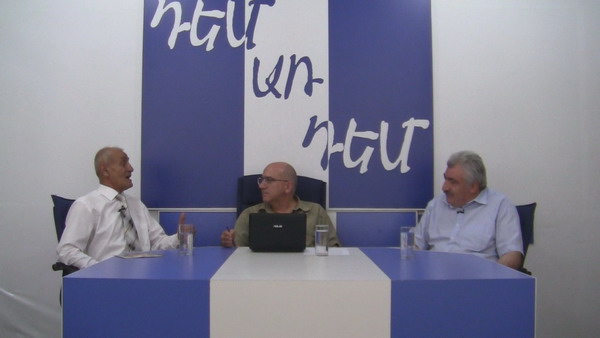The topic of “Aravot” online on the air is discussed between the Director of National Archive of Armenia, Amatuni Virabyan, and the poet, also Soviet dissident, Meruzhan Hovhannisyan
Aram Abrahamyan – 50 years ago, the Soviet Union court passed a decision against Meruzhan. Please remind me, what was it, for how long and for what?
Meruzhan Hovhannisyan – The USSR Supreme Court’s judicial board on criminal cases, investigating the criminal lawsuit against me, sentenced me and my friends, who were seven, including me, to imprisonment for varying terms, including me for 5 years in prison pursuant to Clause One of Article 65 of the Criminal Code, which read propaganda of anti-Soviet agitation, and Article 67, which read an act of collective nature.
A. A. – What did the nationalist of those days mean?
M. H. – In those days, any idea expressing national ideology, like preservation of national language, fight against assimilation and merging and other such acts, was qualified as nationalistic. In my lawsuit, it was interesting that Sayadyan the then was called Sayadov, who was qualifier of these actions, the deputy was Baghramyants, he wrote that Meruzhan’s articles are “sour nationalistic” ones. I have published articles in the “Spyurk” and “Nairi” weeklies, Dashnak’s “Yeritasard Hayastan” newspaper. In those days, they were considered anti-Soviet, but patriotic newspapers.
A. A. – The attitude to nationalism has been changed in these 50 years. What is nationalism in general? Is it good or bad?
Amatuni Virabyan – Nationalism, of course, is good, we should not confuse it with chauvinism, because the latter is approximately fascism, it is an idea equivalent to Nazism, which categorizes a nation higher than other nations. Nationalism is the preservation of national traditions, national ideology and language, which, however, was equivalent to the same chauvinism in the Soviet Union, because the Soviet Union was considering that socialism was already built in the 1930s, and emphasizing the affiliation to any nation was considered a nationalism. In the 1930s, even the Communists were blamed in chauvinism, for example, Aghasi Khanjian. It was necessary to blame them for some “-ism”. For example, if they were not a Trotskyist, so the only thing left was to blame them for nationalism.
A. A. – The matter, however, is about the in the 1964 dissidents. Were all of them “nationalists”, or there were other types of dissidents?
M. H. – Our group of seven started its activities since April 5, 1962. Since then, we started having meetings with various patriotic groups and individuals who were in the diaspora and the homeland. We were guided by nationalist thinking, i.e. we were not considering preferential or preferring our nation, but we wanted to see it among great and worthy nations.
A. A. – Didn’t you act against the Soviet regime?
M. H. – Surely, it was read in my verdict, and it was truly written, I expressed as follows: I want to see Armenia without the Soviet regime, and I was the only person to express accordingly. Today, I also think it is true not because the ideology and policy dominating in today’s homeland is what I desired, no. I want to see the patriotic movement ideology, the carriers of which were Avetis Aharonyan, Garegin Nzhdeh, Drastamat Kanayan and Andranik.
Prepared by Aram ABRAHAMYAN
“Face to Face” talk show series are released by the Open Society Foundations- Armenia. The views and analyzes found in this broadcast express the opinions of the participants, and are not approved by the Open Society Foundations-Armenia, or its Board. This broadcast is made available thanks to comprehensive financial support by the Open Society Foundations-Armenia, under the mass media support program, grant No 18624.




















































